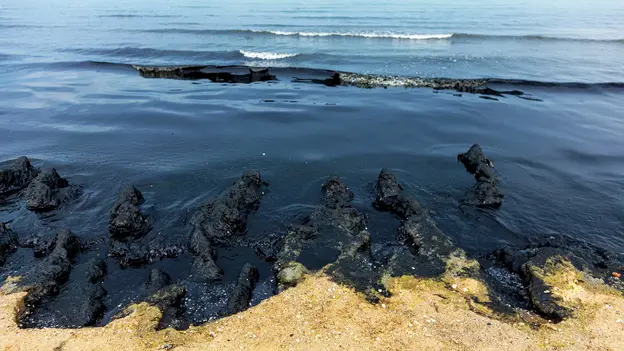Alumni Project
Using Silk-based Nanocomposites to Combat Oil Spills
Laboratory Study
The rising global demand for petroleum fuels increases the risk of oil spills in the context of refining processes and sea transportation. Oily wastewater is one of the most serious environmental concerns nowadays, because of its remarkable impact on the marine ecology and human society. Especially in Egypt, where water is scarce and the population is growing, wastewater treatment is of high priority. In an interdisciplinary research project, AGYA alumnus Dr. Ahmed Khalil and AGYA member Dr. Mahmoud Abdel-Hafiez are seeking for green and low-cost-solutions to optimize water refurbishment in order to close the gap between water needs and supply.
How can silkworms help to adsorb oil in wastewater?
Based on former studies on the potential of superhydrophobic sponges and carbon-based nanomaterials for wastewater treatment, now the properties of silk-based nanocomposites are investigated. Silk is an animal-derived fibre produced mainly from silkworms and is one of the most abundant biopolymers in nature. The surface of silk will be treated with plasma followed by controlled surface decoration with two-dimensional nanomaterials such as graphene oxide (rGO) and molybdenum disulfide (MoS2). It is expected that the silk-based nanocomposites will show outstanding chemical stability and durability after this treatment. Oil adsorption experiments using real oily wastewater samples collected from different places in Egypt will be carried out including oil/water mixtures and oil-in-water nanoemulsions.
Green and low cost solution for a global challenge
The successful development of silk-based nanocomposites will provide a green and low cost solution for oil spills produced by ships as well as oily wastewater generated from different industrial processes. This innovative approach for wastewater treatment is also a step towards overcoming water scarcity in Egypt as well as other countries suffering from water pollution. Working at the interface of academia, industry and society, this project demonstrates that water supply can only succeed in a joint effort.
- Disciplines Involved
- Materials Science, Physics, Engineering
- Cooperation Partners
- Fayoum University, Egypt
- EvoSmart Ltd, Egypt
- Project Title
- Development of Silk-based Nanocomposites for Superior Oily Wastewater Separation
- Year
- 2022
- Funding Scheme
- Alumni Project
- Countries Involved
- Egypt, Germany
- AGYA Publication
- Silk-based 2D Nanocomposites for Superior Oily Wastewater Remediation
- Superior separation of industrial oil-in-water emulsions utilizing surface patterned isotropic PES membranes


